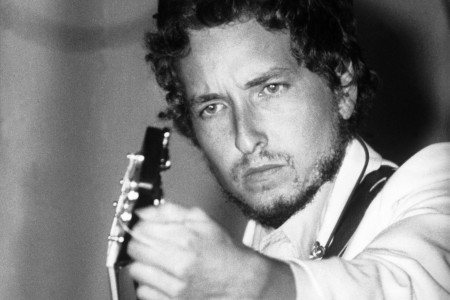Thinkers Are Not The Same As Thoughts.
You Gotta Serve Somebody

Identity politics has taken the place of faith in American life. Why?
It has become abundantly clear that identity politics is a religion. The analogies between progressivism and the Abrahamic faiths, Christianity especially, are (to turn a phrase) legion.
Christianity attributes the brokenness of the world to a pervasive depravity, which is congenital in the human species and ineradicable except by habitual repentance and supernatural aid. This is the doctrine of original sin.
Identity politics accounts for all injustice by reference to what one fanatic has called “an institutionalized, multilayered, multilevel system” of prejudice into which we are born and which irresistibly preconditions the wiring of our brains “regardless of intentions.” This is the doctrine of privilege.
As the Christian sinner must seek forgiveness for his sins by confessing them and receiving mercy from his Lord, so the privileged progressive must beg for absolution by “acknowledging” his bigotry and disavowing it, usually in the form of a tearful public apology. Failure to do so results in expulsion from the network of fellow believers via social opprobrium or, in the case of industries which have adopted the progressive creed as their own standard of business ethics, unemployment.
This comparison makes for an unflattering picture of Christianity, whose practitioners mostly try their best to avoid such extreme measures as excommunication except in the very last resort. And indeed, the form of Christianity which identity politics most nearly resembles is that of the Inquisition: searchingly accusatory, relentlessly petty, and hungry for blood. There have been times when the Church has wandered far from her bridegroom—times when she has looked the way progressives look today.
This is because the best way to describe what Wokeness has actually become is Christianity without Christ. Progressivism recognizes many of the truths about human nature that Christianity has long taught: we are corrupted down to our bones, we do not have help enough to truly help ourselves, and our best attempts at righteousness are as filthy rags. But no evangelist worth his salt will make those assertions without telling you in the next breath that though you were a sinner from your mother’s womb, still the very son of God took flesh to wash you clean with his own blood.
But it is increasingly clear to honest observers that there is no apology, no extremity of self-flagellation, which can ever wipe your record clean of an infraction against Wokeness. Not really. The comedian Kevin Hartt apologized for tweeting “remarks that hurt members of the LGBTQ community,” but he still had to step down from hosting the Oscars. The gun-rights activist Kyle Kashuv confessed to making “idiotic comments” which included racial slurs when he was 16—still, his admission to Harvard was rescinded. Apology and confession are never enough.
Jesus taught that “there is no one righteous,” and so we ought not judge lest we be judged. This has been a constant counterbalance against the ever-present impulse to pharisaism: the Church learns patience under the restraining hand of Christ. Having no such restraint, Progressivism teaches that some (the “oppressed”) are much, much more righteous than others, and that those people are entitled to ruin permanently the lives and careers of anyone who shows himself even slightly unworthy. Why, it may be asked would anyone listen to such teaching?
Why Wokeness?
In this week’s Feature at The American Mind, we try to answer that question. The essays presented in this collection crystallize a moment in the ongoing debate about how and why identity politics came to be as compelling and as threatening to public discourse as it currently is.
In some way they are all responses to Professor Josh Mitchell’s essay for The American Mind earlier this year (“Dead Conservative Memes Can’t Defeat the Identity Politics Clerisy”). Their engagement with one another and with Mitchell’s work is intended to bring clarity to that debate, and to spur further discussion about just what is to be done going forward. Few topics are more urgently important as 2020 looms.
There are some in the present symposium who broadly agree with me, and others who don’t.
For example, podcaster and public speaker Michael Knowles argues in “The Secret Wisdom of Transgenderism” that as the philosophy of identity politics careens into ever more bizarre territory, it actually demonstrates ever more clearly the ineradicable human need for some form of theology. Using transgender ideology as a test case, Knowles argues that Woke religionists are actually just rehashing “every dippy religious whim the Church ever routed,” revisiting ancient heresies in a desperate quest for a new faith that rises above primitive materialism.
Likewise Noelle Mering, co-author of Theology of Home and editor for the website with the same title, claims that “The way to combat the chaos and severity of woke culture is not by diluting the faith, but by deepening it.” For Mering, cases like the striking forgiveness extended by Brandt Jean to the brother of his murderer dramatize the Church’s antidote to the unforgiving gracelessness of progressive ideology. The backlash against Jean perfectly encapsulates that very gracelessness.
On the other hand, this feature also includes writers for whom religion provides neither the whole story of Wokeness’s rise to prominence, nor the right antidote to it.
James Lindsay of Sokal Squared (the group famous for exposing academic corruption in the “Grievance Studies Hoax”) believes that identity politics is simply how Christianity naturally evolved in the modern era.
For Lindsay, identity politics is about control, not meaning. The “substitution hypothesis” put forward by Mitchell (and others who argue that identity politics has replaced religion) is, for Lindsay, inadequate. It’s nearer the truth, for him, to say that people are going woke because “they feel out of control in our hyperpartisan, existentially polarized society, and they’ve reconceived what it means to be a ‘good person’ in terms of this unfortunate political circumstance.”
Finally, social psychologist Pamela Paresky suggests that the heart of identity politics and its appeal is tribal morality and purity testing, or an inability to separate the thinker from his thought. The cure will be a greater devotion to open inquiry and a willingness to examine ideas that the Woke consider taboo: “Nothing can be taken off the table until it has been inspected,” Paresky writes.
Meaning and the Void
Faith, it has often been observed, addresses a number of fundamental needs in the human psyche. That the religiosity of wokeness serves to meet those needs is one of the most compelling extant accounts of its appeal. For Jayme Metzgar of the Federalist, progressivism claims to provide a “framework for right and wrong, for ultimate truth, or for the transcendent meaning that renders life beautiful.” Bo and Ben Winegard at Quillette see in Wokeness a system of, and set of guidelines for, belonging and social cohesion. According to the Spectator’s Douglas Murray in his new book The Madness of Crowds (2019), identity politics furnishes “grand narratives” of human development and purpose which were sorely needed after all other such narratives “became unpopular to defend or impossible to sustain” in the course of the 20th century.
Perhaps the most succinct diagnosis was given by Mitchell in his essay in these pages: “America has not lost its religion. America has relocated its religion to the realm of politics.”
What these narratives have in common is that they see identity politics as having filled a void left in the human heart and mind after belief in God became outré among the intellectuals and fashionable urbanites of the West. Social cohesion, moral consensus, ethical vision and purpose: all these things are obvious positive externalities of a shared belief in God.
Tocqueville observed that despite their innumerable forms of religion, early Americans were united in agreement that there was a God and that he obligated us to one another in certain ways: “Each sect…adores God in its manner, but all sects preach the same morality in the name of God.” This is why, In early America, even a mere theist like Thomas Jefferson could hold that in a state funded university “the proofs of the being of a god, the creator, preserver, & supreme ruler of the universe, the author of all the relations of morality, & of the laws & obligations these infer, will be within the province of the professor of ethics.” And even as our educational system began to cease believing this was true in the early 20th century, for a time they maintained required chapel attendance for the sake of social cohesion.
God is now largely unwelcome in America as a grounds of public moral reasoning: among many examples, consider the 1980 Supreme Court Decision in Stone vs. Graham, according to which it was unconstitutional for Kentucky to require display of the Ten Commandments in public schools. If this is the meaning of “separation between church and state”—if we are to be prohibited as a nation not only from endorsing one religion over another but even from pointing to religion as the ethical foundation of our regime—then it stands to reason that we will need some other totalizing system of thought to give our life together intellectual and emotional cohesion.
The question then becomes whether such a system is possible without reference to the divine. Wokeness is a desperate attempt to answer that question with a yes: the effort to practice Christianity without Christ is at base an effort to practice religion without God.
There have been and likely will be other such attempts, notably the attempt to revive “secular” or “civic” religion—the worship of abstract truths or national symbols—as a viable form of public devotion. This project has fizzled into obscurity even as wokeness has exploded into ever more loudly gibbering incoherence. All these failures reveal not so much the pitfalls of faith as the inescapable need for faith, and the pitfalls of faith done badly.
Bob Dylan was right: you gotta serve something, even if that something is an absurdity.
Whom Shall We Serve?
I think the naked truth is that nothing but God is big enough to make public morality cohere.
The nation cannot sustain our worship any more than Wokeness can: all systems of value require an Ultimate Value which is stable and endures beyond material things. Patriotism, politics, science, justice: all of them must either make reference to some metaphysical standard of truth and goodness or else search for such a standard in the endless flesh and infinite atoms of pure matter, where it is nowhere to be found.
The result of claiming that we just are our biologies, or our grievances, or our nationalities, is already turning out to be mass neurosis and self-annihilation. Something, to put it bluntly, has gotta give.
The uneasy awareness of this reality is already seeping into the bad dreams of our intelligentsia. David Gerlenter, a Yale University professor of computer science, wrote recently that he is beginning to suspect something other than natural selection explains the origin of species more viably than Darwinism. A number of philosophers, among them Marcello Pera in his 2008 book Why We Should Call Ourselves Christians, have begun arguing that though Judeo-Christianity may be untenable in its claim to theological truth, still we must adopt its values as our own.
But this ain’t it, Chief. The rise of Wokeness as a dominant cultural narrative shows that there is no such thing as collectively worshipping nothing. There is only good worship or bad and impotent worship, and without God all worship is the latter. In October, the Democratic presidential hopeful Beto O’Rourke proudly affirmed that he would deny tax exemption to churches which oppose same-sex marriage, making it abundantly clear what progressives want: not the erasure of religion from the public square, but the eradication therefrom of traditional religion and the installment of another, rigorously enforced orthodoxy.
The choice before us is not between religion and no religion, but between one religion and another. We will either find ways to re-establish Judeo-Christian belief as the American default, or we will collapse under the weight of that uniquely hideous illogic and self-loathing that comes of putting your faith in anything other than Him who is worthy thereof.
The American Mind presents a range of perspectives. Views are writers’ own and do not necessarily represent those of The Claremont Institute.
The American Mind is a publication of the Claremont Institute, a non-profit 501(c)(3) organization, dedicated to restoring the principles of the American Founding to their rightful, preeminent authority in our national life. Interested in supporting our work? Gifts to the Claremont Institute are tax-deductible.
Partisanship has swallowed God whole.
Old errors shed new light on eternal truth.
For the woke mob, Judgment day is all day, every day.




